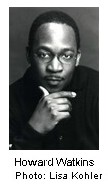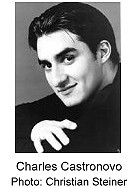
| Recital |
| Lecture / Performance |
ReviewsCharles Castronovo and Squillo
In his insightful review in the Virginian Pilot, Paul Sayegh stressed the expressive and dramatic aspects of the singing. Speaking of Mr. Castronovo's voice, …"Its lower register was full while higher notes took on a slightly metallic tinge, but this added to their presence…" This listener found this exciting sound to be what I believe to be squillo . At the intermission I spoke with Tidewater's own up-and-coming young soprano Ann Scott and she agreed - "lots of squillo." Once again I turned to Karen Scott, Ann's mother, for an answer. What exactly is squillo? "It is a very bright, forward, penetrating sound. It means blare or ring in Italian. Individual voices vary in the amount of natural squillo they possess. It is also a quality cultivated by the singer so that the voice can project over an orchestra. Birgit Nilsson, the great Wagnerian soprano, whose voice could cut through anything, vocalized on 'ae' every day. Squillo is achieved by using the bright Italian vowels such as (E) as in 'bet' or [ae] as in 'fat.' These vowels focus and concentrate the sound and give it a ringing quality that will cut through the dense sound of a full orchestra." To hear such a voice adds great excitement to the texts being sung. We had previously met Castronovo and Watkins at their lecture/demonstration at The Academy of Music so we went backstage after the recital to congratulate them. Steve remarked that Fritz Wunderlich and John Aler are his favorite lyric tenors but he was now adding Charles Castronovo to the pantheon. Mr. Castronovo: "I love Fritz Wunderlich! I listen to him all the time." April 22 Preconcert Lecture/Performance
As part of the Arts Festival Education Program, the two performers came to the Academy of Music in Norfolk on Monday evening, two nights before the recital. In his early remarks after singing Ganymed by Schubert, Charles Castronovo commented that he likes to sing forward...in lots of ways it means in the mask...think of it as a bright vowel...a bright "a". He did not use the term "squillo" but there it is. Both he and Howard Watkins were in the Metropolitan Opera's Young Artists program where Barbara Hocher, Director of the Marilyn Horne Foundation, came to hear them. Their appearance here was presented by the MHF. Charles told us that he went to California State College at Fullerton for two years "but the academic life was too closed-in for me." He got into the Los Angeles Opera Chorus doing small parts for two years. He did self-study. He describes himself as a "huge listener" and just needed to read. "As I get to be more famous, I'm looking forward to getting that honorary degree." The singer has good self-esteem based on as accurate evaluation of his potential for a top-notch opera career. He will sing in Ravel's L'Heure Espagnole at the London Proms this summer. In the just finished 2001-2002 season he was Camille in Merry Widow in Los Angeles, Ferrando in Cosi fan Tutte in Portland, Oregon, Ernesto in Don Pasquale in Boston, Fenton in Falstaff in Toulouse, France and Ottavio in Don Giovanni in Berlin. After the two performed a Liszt song with text by Victor Hugo, Howard reported that he likes to be brash at the piano and is drawn to the romantics like Liszt and Rachmaninoff, but also Bel Canto and Mozart. Also, "I like to play things that appear easy but are hard to do." He spoke of the role of the pianist in a vocal recital vs. a concert. The Rachmaninoff piece was Spring Waters and showcased his intense, skillful playing. "The Quilter selection will be very quiet and poetic compared to these songs." Their advice to students was to have a close-knit group of people you can trust. Get all sorts of advice, listen to your teacher and two or three people you can trust, but keep your own council, make the decisions that feel right to you.Study languages, work hard to understand from inside yourself what each word means and enjoy what you are doing.. "I lost the joy in the Met young artists program...You need to love singing because you only have one perfect voice day per month and you never have a performance that day." After Quilter's Fair House of Joy he was asked about classical singing vs. popular singing. Charles reported that he sang in a rock band in college but "I never was a screamer. It is easy to lose your [breath] support when singing pop." He has learned to focus his big beautiful sound. "To sing a long opera you must do it without tension in the vocal cords." The next question concerned the qualities to look for in a teacher. "Someone who is protective of me but who gives me a kick in the butt when I need it." Protective means saying no to roles that are not suited to your level of developement or voice. Charles went on: "You want someone who has a good ear for your voice, someone who knows repertory and has a personality that fits with your own. You need a manager with these qualities also." He told us that singing is totally scary. It is all about courage. Voice and technique are important, but courage is necessary to get on a stage. He recounts his experience of singing Beppe in I Pagliacci with Dominngo at the Met. He was so frightened that he has no memory of the event. He asked Domingo if experience helps to lessen the tension. Domingo's answer was no, the higher you go, the harder it gets because the stakes are higher. Drugs don't work. Beta blockers calm you but you tend to sing flat. Both young men are very personable, articulate and well educated and we plan to watch their careers as they grow. |
 Readers who missed Charles Castronovo, tenor and Howard Watkins,
pianist at the Harrison Opera House, Wednesday, April 24, missed
a rare treat. These young performers gave us a passionate recital
of songs by Schubert, Mozart, Liszt, Rachmaninoff and Roger Quilter.
A beautiful lyric tenor voice accompanied by a very knowledgeable
and passionate pianist deserved a better audience than Tidewater
gave them. The concert was sponsored by NATO and much of the audience
seemed new to art song, clapping after every" tune". Given the number
of Virginia Arts Festival events that night, the usual art song
audience was either performing or attending elsewhere.
Readers who missed Charles Castronovo, tenor and Howard Watkins,
pianist at the Harrison Opera House, Wednesday, April 24, missed
a rare treat. These young performers gave us a passionate recital
of songs by Schubert, Mozart, Liszt, Rachmaninoff and Roger Quilter.
A beautiful lyric tenor voice accompanied by a very knowledgeable
and passionate pianist deserved a better audience than Tidewater
gave them. The concert was sponsored by NATO and much of the audience
seemed new to art song, clapping after every" tune". Given the number
of Virginia Arts Festival events that night, the usual art song
audience was either performing or attending elsewhere.